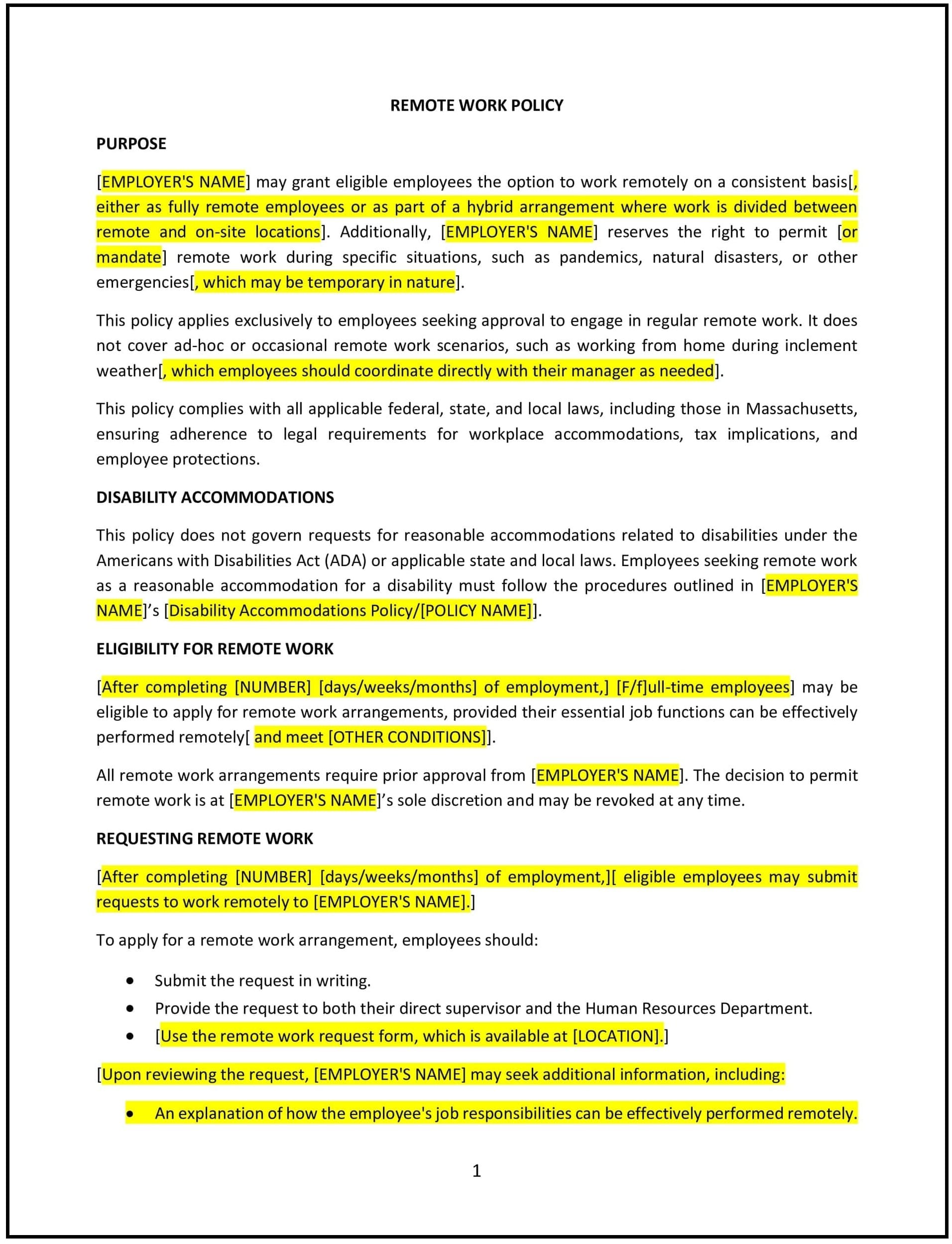Got contracts to review? While you're here for policies, let Cobrief make contract review effortless—start your free review now.

Customize this template for free
This remote work policy is designed to help Massachusetts businesses manage the logistics and expectations surrounding remote work arrangements. The policy outlines the conditions under which employees can work from home or other off-site locations, the responsibilities of remote workers, and how remote work aligns with company goals and operations. It promotes compliance with Massachusetts state laws and federal regulations, while supporting a flexible, productive, and balanced work environment.
By adopting this policy, businesses can effectively manage remote work arrangements, improve employee satisfaction, and maintain operational efficiency, all while promoting compliance with applicable labor laws.
How to use this remote work policy (Massachusetts)
- Define remote work eligibility: Specify which employees are eligible for remote work based on factors such as their job role, department, or individual performance. This policy should outline any specific conditions under which remote work is permitted, such as during special circumstances or as a long-term arrangement.
- Establish remote work expectations: Clearly define the expectations for employees working remotely. This may include setting regular working hours, ensuring availability for virtual meetings, maintaining productivity standards, and communicating effectively with teams. Employees should be aware of the performance metrics used to evaluate their remote work.
- Address communication protocols: Outline the tools and methods of communication that employees should use while working remotely, such as email, instant messaging, video conferencing, and project management platforms. The policy should also specify expectations regarding response times and availability during working hours.
- Define equipment and technology requirements: Specify the equipment, technology, and software needed for remote work. The policy should outline whether the company provides employees with necessary equipment (e.g., laptops, monitors) or if employees are expected to supply their own. It should also address security protocols for accessing company systems and data remotely.
- Discuss security and data protection: Emphasize the importance of maintaining data security and confidentiality when working remotely. Employees should be required to follow company guidelines on using secure networks, preventing unauthorized access, and ensuring that company devices are protected from theft or misuse.
- Set boundaries for work-life balance: Encourage employees to maintain a healthy work-life balance while working remotely. The policy should remind employees that remote work is not an excuse to overwork or blur the lines between personal and professional responsibilities.
- Ensure compliance with Massachusetts and federal laws: Ensure that the policy complies with Massachusetts state laws, including the Massachusetts Paid Family and Medical Leave (PFML) law, and federal regulations such as the Fair Labor Standards Act (FLSA), which governs wage and hour laws. This includes addressing issues related to overtime, expense reimbursement, and maintaining employee rights while working remotely.
- Review and update regularly: Periodically review and update the policy to ensure it remains aligned with Massachusetts state laws, federal regulations, and the evolving needs of the company. Regular updates will ensure that the policy remains effective and compliant with changing legal and business requirements.
Benefits of using this remote work policy (Massachusetts)
This policy offers several benefits for Massachusetts businesses:
- Promotes flexibility and employee satisfaction: By allowing employees to work remotely, businesses offer greater flexibility, which can improve work-life balance, reduce stress, and increase employee satisfaction and retention.
- Increases productivity: Clear expectations for remote work can help employees stay focused and productive. The policy helps establish guidelines that promote efficient work while maintaining accountability.
- Supports a diverse and inclusive work environment: Remote work can help attract and retain a diverse workforce by allowing employees with varying needs, including caregivers or individuals with disabilities, to perform their job duties from home.
- Reduces overhead costs: Remote work can reduce costs associated with maintaining physical office space, utilities, and other in-office expenses, leading to potential cost savings for businesses.
- Supports compliance with labor laws: The policy helps businesses maintain compliance with Massachusetts state laws and federal regulations, ensuring that remote work arrangements are legally sound and that employees' rights are protected.
- Strengthens communication and collaboration: With clear communication protocols and tools in place, businesses can continue to foster collaboration and teamwork among remote employees, ensuring that remote work does not impede effective communication.
Tips for using this remote work policy (Massachusetts)
- Communicate the policy clearly: Ensure that all employees are aware of the remote work policy and understand the expectations and responsibilities that come with working remotely. Include the policy in the employee handbook and discuss it during onboarding or team meetings.
- Provide the necessary tools and resources: Ensure that employees have the tools and resources they need to be successful when working remotely. This includes providing appropriate technology, access to software, and support for troubleshooting technical issues.
- Establish a system for monitoring performance: Set up a system for tracking remote employees’ performance based on agreed-upon metrics. This helps ensure that productivity standards are met and provides transparency in the remote work process.
- Foster a culture of communication: Encourage open and frequent communication among remote employees and their teams. Regular check-ins, virtual meetings, and collaborative tools can help employees stay connected and informed.
- Prioritize security: Provide training and resources on maintaining data security and following best practices for remote work security. Encourage employees to use secure networks, avoid sharing sensitive information in unsecured settings, and follow company guidelines for accessing company data remotely.
- Review and update regularly: Periodically review the policy to ensure it remains aligned with Massachusetts state laws, federal regulations, and the company’s evolving business needs. Update the policy as necessary to address changes in remote work practices or technology.